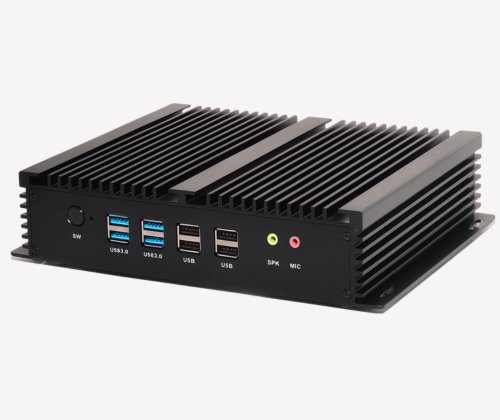Smart manufacturing is changing how factories run. It’s not just about robots and automation; it’s about connecting systems, gathering real-time data, and making faster decisions. Right at the heart of this shift is a compact but powerful solution: the Industrial PC.
If you’re wondering what makes these computers different or why they matter in industrial environments, you’re not alone. This guide breaks down how Industrial PCs are actually used on factory floors, production lines, and automated systems without technical jargon.
From Embedded PCs to Box PCs like the MIC-7700, here’s how manufacturers are using these reliable machines every day.
Industrial PCs in Machine Vision Systems
Modern factories rely on cameras and sensors to inspect products, measure dimensions, and track defects. That’s where Industrial PCs come into play.
They process high-speed image data and run software that supports pattern recognition, object detection, and quality checks all in real time.
Benefits:
- Improves product quality without manual checks
- Cuts down on human error
- Speeds up production lines
- Can handle 24/7 usage without overheating
Why it works:
Industrial PCs such as the MIC-7700 handle demanding tasks like video processing and data analysis while staying compact and fanless.
Factory Automation and Control Systems
When machines need to talk to each other and follow preset instructions, they use programmable logic controllers (PLCs). Industrial PCs connect these systems and make the communication smarter.
Whether it’s managing conveyor belts, robotic arms, or packing lines, these systems run better with Box PCs that deliver reliable control and performance.
Common Uses:
- Coordinating different machines on the floor
- Managing PLCs and SCADA systems
- Handling live updates and changes in production speed
Why manufacturers choose Embedded PCs:
They’re space-saving, resist dust and heat, and operate non-stop.
Human-Machine Interface (HMI) Applications
Operators need to see what machines are doing. HMIs give them that window via touchscreens and control panels. Behind the display? A tough Industrial PC doing the real computing.
Industrial PC applications in HMI:
- Displaying real-time machine data
- Triggering alarms or safety alerts
- Allowing operators to change settings
- Monitoring performance remotely
A fanless Box PC is often the engine behind this seamless user experience, especially in hot or dusty environments.
Predictive Maintenance and Monitoring
Instead of waiting for a machine to fail, Industrial PCs gather data to predict when something might go wrong. This helps reduce downtime and lowers repair costs.
How it works:
- Sensors feed data into an Embedded PC
- Software monitors temperature, speed, vibrations, etc.
- The system flags unusual behavior before breakdowns happen
MIC-7700 models are popular in this space due to their processing strength and industrial-grade durability.
Real-Time Quality Control
Quality assurance doesn’t have to happen at the end of the line. Using Industrial PCs, manufacturers can monitor product quality while production is in motion.
Applications:
- Real-time rejection of faulty products
- Barcode scanning
- Weight checks
- Packaging validation
This leads to faster production cycles and fewer returns.
Data Acquisition and Industrial IoT Integration
Factories run on data. Sensors collect everything from temperature to motor speed, and Industrial PCs act as the data hub.
They take inputs from multiple sensors, process it locally, and send only useful data to cloud systems or dashboards.
Use Cases:
- Gathering production line metrics
- Creating reports for compliance
- Feeding data into ERP or MES systems
Industrial PCs in this role often include DIN rail Box PCs or rugged Embedded PCs for mounting inside control cabinets.
Robotics and Smart Motion Control
Modern factories rely heavily on robots for assembly, sorting, and pick-and-place tasks. These systems need constant instructions in microseconds.
Industrial PCs control robots by:
- Calculating trajectories
- Sending movement instructions
- Ensuring safety interlocks are active
- Syncing multiple axes in real time
Box PCs like the MIC-7700 are frequently used in robotic arms and CNC systems due to their powerful GPU support and long product life cycle.
SCADA and Process Visualization
Supervisory Control and Data Acquisition (SCADA) systems are the digital dashboard of a factory. Industrial PCs are often the backbone of these platforms.
Roles include:
- Displaying all machine statuses on one screen
- Managing alarms and system messages
- Remote access and diagnostics
- User access control and historical data viewing
Because these systems often run 24/7, fanless Industrial PCs are preferred to avoid overheating or failures.
Secure Gateway Between OT and IT
Smart factories run two types of networks: Operational Technology (OT) and Information Technology (IT). Industrial PCs act as secure bridges between these systems.
What they do:
- Encrypt communication between devices
- Authenticate users and devices
- Transfer selected data from shop floor to cloud systems
These PCs are built to avoid interference from electromagnetic noise, making them ideal for heavy-duty environments.
Remote Factory Access and Control
Need to monitor or update machines without being on-site? Industrial PCs make that possible.
Applications include:
- Live video feed of the factory
- Remote software updates
- Performance tracking from anywhere
- Troubleshooting without physical visits
With the rise of Industry 4.0, Global Infotech Solution offers models that support LTE, Wi-Fi, and secure VPN access for factory managers.
Why Industrial PCs Are Better for Manufacturing
Regular PCs aren’t built for the heat, vibration, or dust found in manufacturing units. Industrial PCs solve that by offering:
- Fanless operation for quiet, dust-proof usage
- Wide temperature support to work in cold or hot areas
- Mounting flexibility with options like wall mount, rack mount, or DIN rail
- Longer product life cycles, reducing upgrade costs
Whether you’re integrating a Box PC, Embedded PC, or a MIC-7700 unit, these systems stay reliable under stress.
Why Choose Global Infotech Solution for Your Industrial PC Needs
At Global Infotech Solution, we help manufacturers find the right Industrial PC no guesswork involved. With ready stock, expert guidance, and support for advanced models like MIC-7700, we’ve made it simple for factories to switch to smarter systems.
Need help choosing between an Embedded PC and Box PC? Want a setup built for your production line? We’re here to assist with that.
FAQs
Q1. What is the difference between a regular PC and an Industrial PC?
Answer: Industrial PCs are built to handle extreme environments like heat, dust, and vibration. They often run 24/7 without fans or cooling systems, making them ideal for factories.
Q2. Can Industrial PCs work with IoT sensors?
Answer: Yes, Industrial PCs are perfect for connecting to sensors. They collect, process, and send sensor data for analytics and automation.
Q3. What is the role of MIC-7700 in manufacturing?
Answer: The MIC-7700 is a compact and powerful Industrial Box PC used in automation, robotics, and real-time monitoring. It’s known for its reliability and performance in harsh conditions.
Q4. How long does an Industrial PC last?
Answer: Most Industrial PCs are designed for long-term use usually 5 to 7 years or more, without needing frequent replacement.
Q5. What industries benefit most from Industrial PCs?
Answer: Industries like automotive, electronics, packaging, food processing, and pharmaceuticals use Industrial PCs for automation, monitoring, and safety.
Conclusion
Smart manufacturing demands systems that are not only smart but also reliable, secure, and built to last. That’s where Industrial PCs come in. From quality control to robotics, from remote access to data acquisition, these compact machines are driving the future of factory operations.
Choosing the right Industrial PC whether a Box PC, Embedded PC, or a model like MIC-7700, can directly improve uptime, speed, and product quality.
If you’re planning to upgrade or build a smarter factory setup, Global Infotech Solution can guide you through every step—making sure your investment matches your industrial needs.

